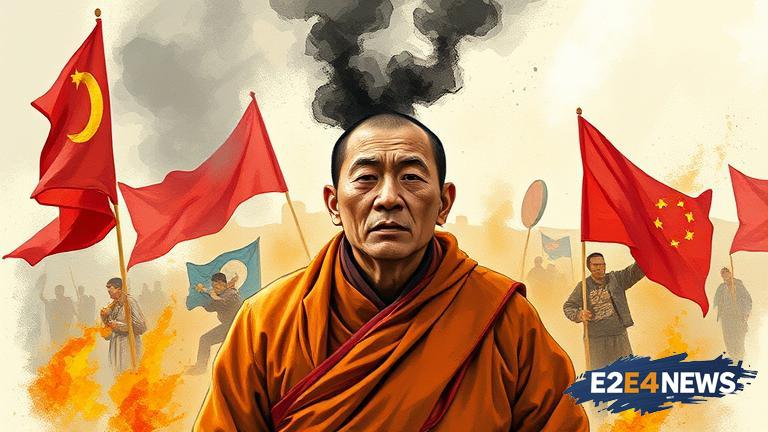In a tragic incident, a Tibetan monk has self-immolated in protest against the Chinese government’s repressive policies in Tibet. The incident occurred on August 26, 2025, in the Ngaba region of Tibet, where the monk, identified as Tenzin Dhargye, set himself on fire in front of a crowd of onlookers. This act of self-immolation is the latest in a series of protests against Chinese rule in Tibet, which has been ongoing for decades. The Tibetan people have been fighting for their freedom and human rights, which have been severely curtailed by the Chinese government. The Chinese government has been accused of human rights abuses, including torture, arbitrary detention, and suppression of freedom of speech and assembly. The Tibetan people have been subjected to forced assimilation, cultural erasure, and economic marginalization. The self-immolation of Tenzin Dhargye is a desperate cry for help, a plea to the international community to take notice of the suffering of the Tibetan people. The incident has sparked widespread outrage and condemnation, with many calling for an end to Chinese rule in Tibet. The Tibetan government-in-exile has issued a statement condemning the incident and calling for international intervention. The Chinese government has responded by tightening security in the region and restricting access to the area. The incident has also sparked a wave of protests and demonstrations around the world, with Tibetans and supporters calling for freedom and human rights in Tibet. The self-immolation of Tenzin Dhargye is a reminder of the ongoing struggle for freedom and human rights in Tibet, and the need for the international community to take action to support the Tibetan people. The incident has also highlighted the need for a peaceful resolution to the Tibet issue, one that respects the rights and dignity of the Tibetan people. The Chinese government must be held accountable for its human rights abuses in Tibet, and the international community must take concrete steps to support the Tibetan people in their struggle for freedom. The self-immolation of Tenzin Dhargye is a tragic reminder of the desperation and frustration felt by the Tibetan people, and the need for urgent action to address the crisis in Tibet. The incident has sparked a wave of solidarity and support for the Tibetan people, with many calling for an end to Chinese rule in Tibet. The Tibetan people will continue to fight for their freedom and human rights, and the international community must stand in solidarity with them. The self-immolation of Tenzin Dhargye is a powerful symbol of the Tibetan people’s resistance against Chinese rule, and a reminder of the need for freedom and human rights in Tibet. The incident has also highlighted the importance of preserving Tibetan culture and identity, which is under threat from Chinese assimilation policies. The Tibetan people have a rich and unique culture, which is an important part of their identity and heritage. The Chinese government’s policies of forced assimilation and cultural erasure are a threat to the very existence of the Tibetan people. The self-immolation of Tenzin Dhargye is a desperate cry for help, a plea to the international community to take notice of the suffering of the Tibetan people and to take action to support their struggle for freedom and human rights. The incident has sparked a wave of outrage and condemnation, with many calling for an end to Chinese rule in Tibet and for the international community to take concrete steps to support the Tibetan people. The Tibetan people will continue to fight for their freedom and human rights, and the international community must stand in solidarity with them. The self-immolation of Tenzin Dhargye is a tragic reminder of the ongoing struggle for freedom and human rights in Tibet, and the need for urgent action to address the crisis in Tibet.
